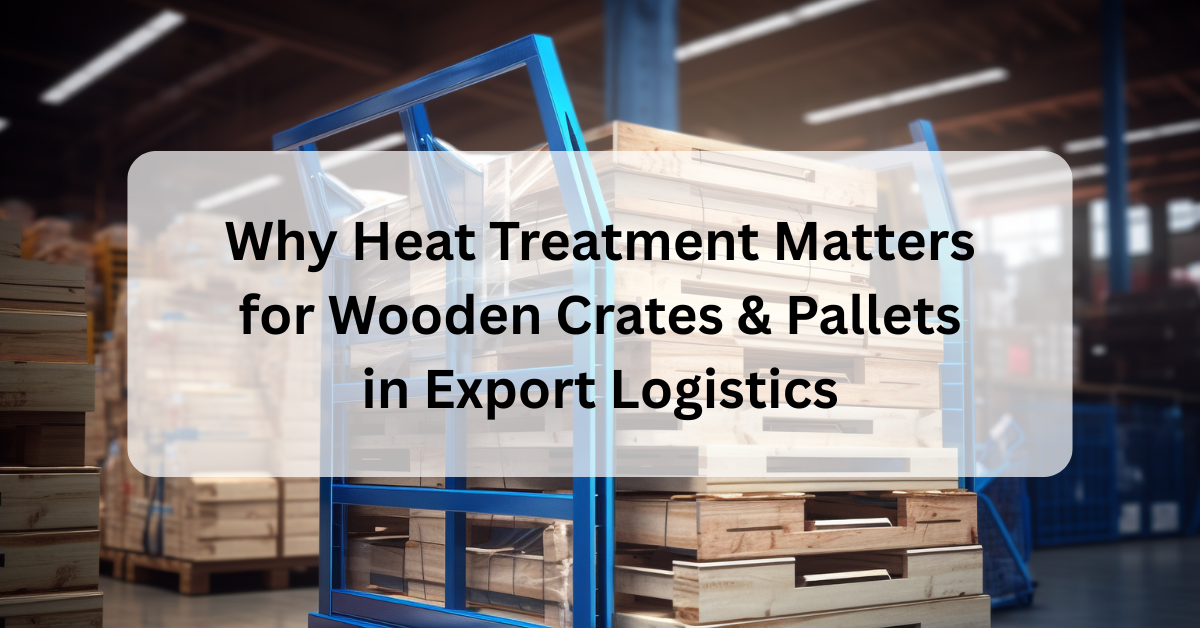Exporting goods from Singapore requires more than just reliable logistics—it demands packaging that meets strict international standards. Wooden crates and wooden pallets are among the most widely used packaging solutions, but untreated wood can carry pests and diseases that threaten ecosystems abroad.
That’s where heat treatment comes in. By ensuring your packaging complies with ISPM 15 (International Standards for Phytosanitary Measures No. 15), you protect your shipments, avoid costly delays, and maintain your reputation in overseas markets.
What Is Heat Treatment for Wood Packaging?
Heat treatment is a process that uses high temperatures to eliminate insects, larvae, and pathogens living inside wood. According to ISPM 15 guidelines, wood must be heated until its core reaches 56°C for at least 30 minutes. Once completed, the packaging receives the internationally recognised IPPC “wheat stamp.”
This stamp shows that your wooden crates and wooden pallets are export-ready. Without it, customs authorities in many countries may reject or quarantine your shipment. You can read more about Singapore’s implementation of ISPM 15 on the NParks website, which oversees plant health and biosecurity.
Why Heat Treatment Is Critical for Singapore Businesses
1. Compliance with International Standards
Most major trading nations—including the EU, US, China, and Australia—require ISPM 15 certification. Non-compliant packaging could mean delays, costly fumigation at ports, or outright rejection.
2. Protection Against Pests & Diseases
Singapore is a global trade hub. Without proper treatment, wooden packaging could introduce harmful pests into foreign ecosystems. Heat treatment ensures your packaging is pest-free, reducing risk for your business and trading partners.
3. Reputation & Trust
Clients and overseas distributors expect goods to arrive on time and intact. Using properly treated wooden pallets and wooden crates shows professionalism and care, strengthening your credibility in global markets.
4. Cost Savings in the Long Run
While heat-treated packaging may cost slightly more upfront, it prevents expensive re-shipping, penalties, and loss of business caused by non-compliance.
How Heat Treatment Works at Kai Beng
At Kai Beng, we provide in-house heat treatment for all types of wooden crates and wooden pallets, ensuring that every shipment is certified and compliant. Our process includes:
- Core Temperature Monitoring – Advanced equipment ensures every piece of wood reaches the required 56°C threshold.
- Precision Treatment – Crates and pallets are treated without compromising structural strength.
- ISPM 15 Certification & Marking – Each item receives the proper stamp and documentation.
- Full Traceability – We keep detailed records of treatment batches, which can be important for audits or inspections.
This combination of quality control and compliance ensures your packaging won’t cause problems at the border.
Wooden Crates vs. Wooden Pallets: Which Needs Heat Treatment?
Both wooden crates and wooden pallets require heat treatment if made from raw solid wood. The choice between the two depends on your cargo:
- Wooden Crates are ideal for heavy, fragile, or high-value machinery that requires full enclosure and protection from impact, moisture, or theft.
- Wooden Pallets are better suited for stackable goods and shipments that benefit from easy handling with forklifts or pallet jacks.
Regardless of choice, heat treatment is mandatory for export if the packaging is solid wood. Engineered wood products (like plywood or particleboard) may sometimes be exempt, but exporters should confirm with official references such as the Singapore Customs guidelines.
Best Practices for Exporters in Singapore
- Work with Certified Suppliers – Only engage packaging providers who can provide ISPM 15-certified wooden crates and wooden pallets.
- Inspect the Markings – Before shipping, confirm that the IPPC stamp is visible and valid.
- Plan Ahead – Heat treatment requires scheduling, so avoid last-minute requests that could delay shipments.
- Keep Documentation – Some countries may require proof beyond the stamp—always request a certificate of treatment.
- Avoid Post-Treatment Alterations – Cutting or repairing wood after heat treatment invalidates compliance unless re-treated.
Why Kai Beng Is the Trusted Choice in Singapore
For decades, Kai Beng has been Singapore’s trusted partner for wooden crates and wooden pallets. By offering custom packaging solutions alongside certified heat treatment services, we ensure your shipments are protected, compliant, and ready for global export.
We don’t just build packaging—we provide peace of mind that your goods will reach their destination safely, without delays or penalties.
Conclusion
Heat treatment is not just a compliance requirement—it’s an investment in smooth logistics and global trust. Whether you need wooden crates to protect sensitive machinery or wooden pallets for bulk shipments, choosing a certified provider ensures your cargo moves without interruption.
In Singapore’s competitive export market, businesses can’t afford delays or rejected shipments. With Kai Beng’s heat-treated packaging solutions, you get certified quality, international compliance, and a partner dedicated to safeguarding your exports.
